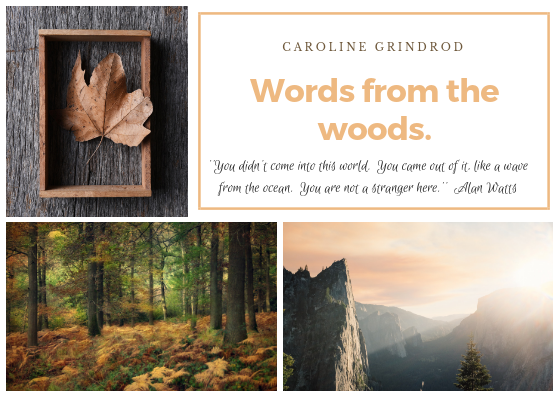
Words from the woods: Meditations on Being
As I was meditating under one of my favourite yew trees today in the pouring rain, Joss, the Jack Russell who can be credited with getting me out the door on such a wild and unappealing day, was trying to dig himself a hole to escape the weather.
I told him to stop, it seemed damaging and disrespectful somehow. Then I looked around and noticed the woody carnage that lay on the floor under the canopy of this majestic tree – dead branches everywhere.

Dead branches, which I know all too well have an important ecological function, supporting hundreds of small creatures which in turn all become food for some other important species and on and on…
It set me thinking about life, injury, decay and ultimately death. This usually happens when I try and meditate, my mind goes off on an endless train of random thoughts.
Each stage in the life cycle is equally important, it provides life and purpose to another living thing. It’s just that humans are at the top of the food chain and have a huge brain that allows us to rationalise. We’ve decided that we’re more important than these other creatures. We no longer consider ourselves part of this food web.
I think that this disconnect is responsible for a huge part of why, on the whole, humans are prone to depression and stress. Other creatures seem to simply accept their role and deal with what comes up – death included. They don’t think ahead. They’re completely ‘present’ – unlike my wondering mind!
Interestingly this ties in with some old and new philosophy. Stoic philosophy suggests that simply dealing with our hardship is an important part of becoming a mentally stronger and a more morally sound person. It’s the art of turning adversity into advantage.

When a battle rages in our heads between what’s happening to us and what we think should happen to us, it causes great angst.
Byron Katie who created the philosophy she calls ‘The work’ says; “I am a lover of what is, not because I’m a spiritual person, but because it hurts when I argue with reality.”
She created a useful line of inquiry for using on ourselves;
When you get stuck on an unhappy or discontented thought, ask yourself four questions:
- Is it true?
- Can you absolutely know that it’s true?
- How do you react, what happens, when you believe that thought?
- Who would you be without the thought?
The next step of The Work, the turnaround, is a way of experiencing the opposite of the believed thought. For example, the thought “My husband should listen to me,” can be turned around to “I should listen to my husband,” “I should listen to myself,” and “My husband shouldn’t listen to me.”
This powerful tool allows us to accept the situation and put our focus on the here and now. Moments such as sitting under the beautiful Yew Tree with the cool rain dripping down my face, feeling the rough bark under my fingers and breathing in the earthy smell created by the stirred up soil – which incidently has created a perfect site for a new seedling to germinate.
Caroline Grindrod


No Comments